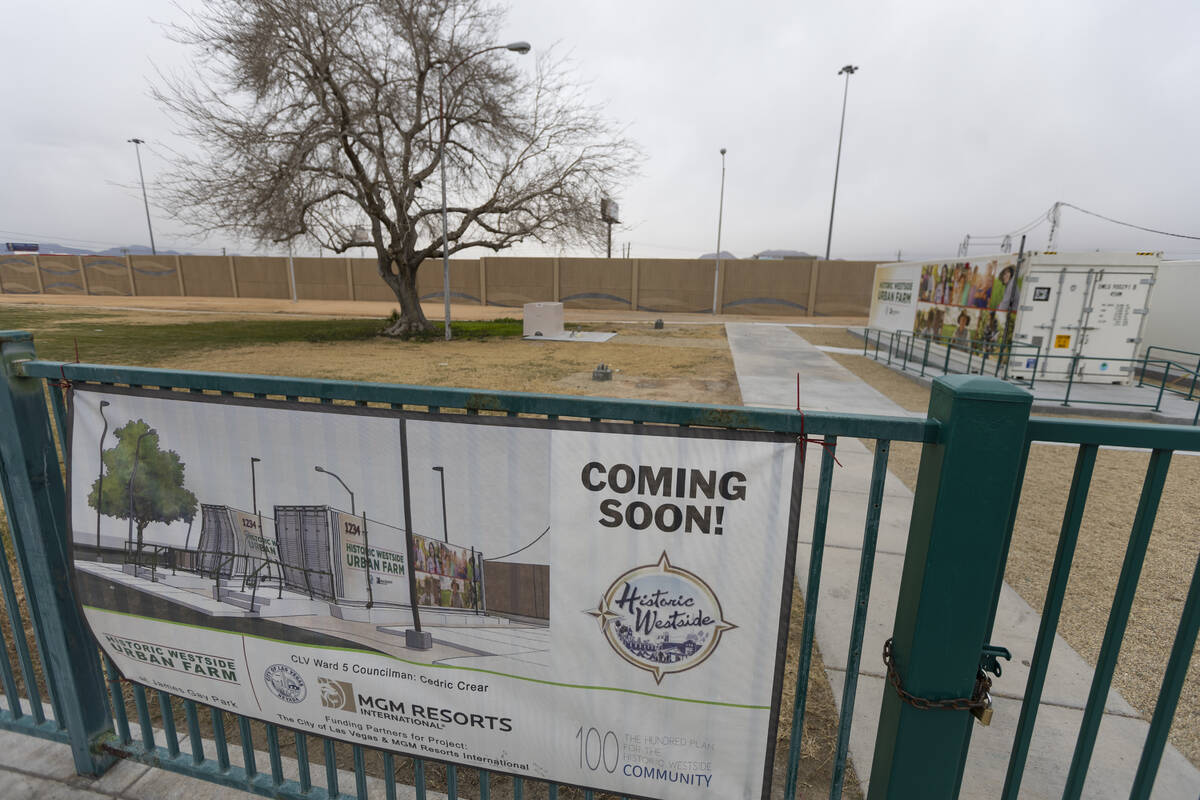'Urban farm' to bring fresh produce to Historic Westside
'Urban farm' to bring fresh produce to Historic Westside
January 20, 2023
Las Vegas Review-Journal
By Ricardo Torres-Cortez
On first appearance, a pair of 40-foot shipping containers discreetly fenced in a shuttered Historic Westside park are quiet and unassuming.
But their December installation was only part of the first phase for an ambitious cooperative “urban farm” that city of Las Vegas officials hope will revolutionize how food insecurity in the predominantly Black neighborhood is addressed.
“One part of that is to get fresher foods into the community,” Las Vegas Councilman Cedric Crear said in an interview. “Leafy greens, vegetables, fruit.”
Crear said that prior to the pandemic, up to one in four residents was determined to be underfed. “The downturn in the economy didn’t help,” he said.
The inaugural harvest will be seeded later this month and begin sprouting within eight weeks, Crear said. The city said that it’s in the process of hiring urban farmers, who will be trained at the site. Utilities recently were installed.
Big plans
Bigger picture, Crear said, James Gay III Park — tucked between Harrison Avenue and B Street — could be home to a multi-storied vertical harvest facility with affordable housing next door. Its namesake, who died in 1999, is known to have spearheaded efforts to desegregate the Las Vegas Strip.
The park, bedeviled by crime and homeless encampments, was closed by the city in 2013.
The project is part of the city’s “Hundred Plan,” an investment kicked off in 2016 to help redevelop the neighborhood.
The Las Vegas City Council recently voted to enter an agreement with Vertical Harvest Inc. to “explore” the development of the 70,000-square-foot facility, plus housing and parking on two acres of park land, city officials said.
“The community is ecstatic about it,” Crear said. “We need quality food. We need fresher foods.”
MGM Resorts International donated $500,000 to acquire the large containers, which were manufactured by a Boston-area company, the city said.
The climate-control structures, which occupy 320 square feet, are capable of operating year-round and produce eight tons of produce, the city said. “The containers provide diversified crop production capability — their systems can grow lettuce, leafy greens, herbs, vining berries and vegetables, rooted vegetables and flowers, allowing for the growth of produce that is needed and desired by Historic Westside residents,” reads a post on a city blog.
Free and discounted food
Crear said Supplemental Nutrition Assistance Program beneficiaries would receive the food for free. Other area residents will obtain discounts, the city said; 45 percent of neighborhood residents are enrolled in SNAP.
To help sustain the project, the crops also will be sold to MGM-owned restaurants, and the general public will also be allowed to shop at the farm. The operation will help supplement the seven food pantries in the Historic Westside, which the city said are limited in hours of service and the healthy food they offer.
And while the neighborhood doesn’t have a full-service grocery store, the city said the project is not meant to be competition to “existing resources.” Officials noted that it’s helping area markets expand, including a recent $1 million award from the city to Mario’s Market, a fixture in the community.
“The urban farm will enhance offerings to the public,” the city said. “It is filling a niche that has been nearly void for many years.”
Crear said the farm is just one of several projects underway in the area, and in five to 10 years, “you won’t even recognize what’s going on here.”
“We have more people and more companies coming into the Historic Westside that want to help and get things going, which has allowed us to really move forward,” he said. “It all ties in together. It’s not just one silver bullet.”

